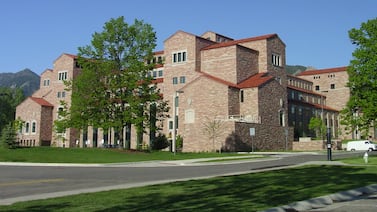Sign up for Chalkbeat Colorado’s free daily newsletter to get the latest reporting from us, plus curated news from other Colorado outlets, delivered to your inbox.
After many months without public discussion, the Denver school board is once again debating a policy about how and when to close or consolidate schools due to declining enrollment.
Enrollment in Denver Public Schools has been declining for a while, and the district has already closed and consolidated some schools. An influx of new students from South America stemmed further enrollment declines this school year, but board members acknowledged during a work session on Monday that they expect DPS will need to close more schools in the future.
“At some point, all of us as board members are highly conscious of the fact that we’re going to have to close schools, we’re going to have to consolidate schools, we’re going to have to bring communities together,” board member Scott Esserman said.
Esserman drafted the policy under consideration, known officially as Executive Limitation 18. In writing it, Esserman said he drew upon a pair of similar proposals drafted last year by former board member Scott Baldermann that would have capped enrollment at some schools, adjusted attendance boundaries, and laid out a timeline for school closures. Though the board asked for public feedback on those proposals, it never took a vote.
It’s not clear when the board will vote on this proposal, either. But the timeline could be tight.
The proposed policy says that the superintendent must recommend school consolidations to the board by October each year, and the board must vote by January. That’s when DPS opens its school choice window and many families make decisions about where to send their children.
The proposed policy also says:
- The superintendent should propose schools for closure or consolidation in a way that distributes the burden of declining enrollment “across governance types,” meaning that the policy would apply to both district-run and charter schools.
- Standardized test scores or a school’s state rating should not be used “as a condition” for consolidation or closure. Instead, it says the board should understand the “improved educational experiences” and “expected financial efficiencies” of consolidating schools.
- The district should involve the community in the process by discussing with parents and others the district’s demographic trends, the positive implications of proceeding — and the negative implications of not proceeding — with consolidation or closure, and more.
- Impacted students would have priority to enroll at all remaining district-run and charter schools and be guaranteed a seat at their boundary school.
Board members spent two hours Monday going through the proposed policy line by line, making tweaks and changing language, such as adding the word “closure” to the policy’s title. But they didn’t finish, making it only part way through page one of the three-page document. Board members implied they would continue the work at future meetings.
Melanie Asmar is the bureau chief for Chalkbeat Colorado. Contact Melanie at masmar@chalkbeat.org.




